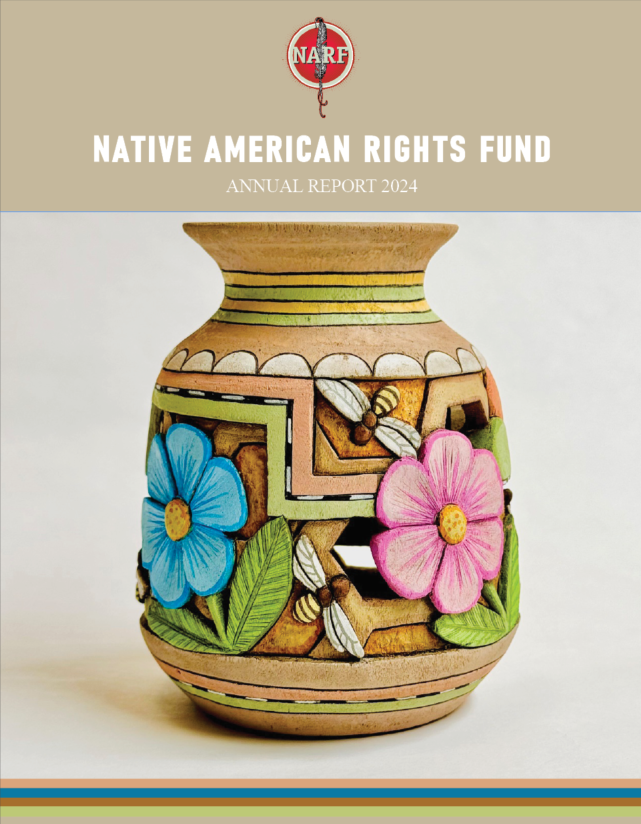
The NARF 2024 Annual Report is now available!
The annual report is an opportunity to see how your donations are paying off as an investment in justice. The report covers projects and case development from the past year and is organized by NARF’s five guiding principles:
1. Preserve tribal existence
2. Protect tribal natural resources
3. Promote Native American human rights
4. Hold governments accountable to Native Americans
5. Develop Indian law and educate the public about Indian rights, laws, and issues
In addition to NARF’s work, this year’s report features an inside look on storytelling through woodcarving from Hopi artist Mavasta Honyouti, an award winning artist, educator, and author. We hope you can take a moment and check out the report!
From the Report: Executive Director’s Report
2024 was the 54th year that the Native American Rights Fund has served as the national Indian legal defense fund providing legal advice and assistance to Tribes, Native organizations, and individuals in cases of major significance across the country. Once again, we were proud to be able to help our Native American clients achieve several significant legal victories and accomplishments during the year.
In 2021, in response to the salmon crash, the United States closed the Kuskokwim River fishery in Alaska but continued to provide the rural preference for subsistence users under the Alaska National Interest Lands Conservation Act. However, the State of Alaska claimed to open the river to fishing by all Alaskans. In response, the U.S. sued Alaska for interfering with the rural subsistence preference under federal law. On behalf of the Association of Village Council Presidents and two subsistence users, NARF intervened in the case on the side of the U.S. The court has ruled in favor of the U.S. and NARF’s clients, but Alaska has appealed to the Ninth Circuit.
Also in Alaska, in 2023 the Environmental Protection Agency denied a permit for the proposed Pebble Mine at the headwaters of the largest salmon producing river in the Bristol Bay area that many Tribes depend on for sustainable salmon runs. The State of Alaska filed a lawsuit directly in the U.S. Supreme Court arguing EPA’s action violates the Alaska Statehood Act of 1959. NARF filed an amicus brief on behalf of the Tribes opposing Supreme Court review and the Court denied review.
The Bureau of Land Management in 2024 released a final Environmental Impact Statement that made clear that allowing mineral or gas development would have significant adverse impacts on the 27 Tribes of the Bering Sea-Interior Tribal Commission in Alaska and pose a threat to the continuation of traditional subsistence-based ways of life. NARF worked with the Tribal Commission for many years to develop comments and engage on the issue.
In Crow Tribe v. Repsis, the District Court issued its final decision affirming the supremacy of the Tribe’s treaty rights to hunt on unoccupied lands in Wyoming. NARF was co-counsel to the Crow Tribe of Montana.
In 2024, the U.S. agreed to join the Upper Columbia River general stream adjudication to help determine the reserved water rights of the Confederated Tribes of the Colville Reservation. NARF represents the Confederated Tribes.
NARF was co-counsel in an amicus brief filed in 2024 in the First Court of Appeals of Texas for a multi-racial coalition, explaining how hair styles associated with Black and Indigenous heritage and racial identity are protected by the Texas CROWN Act. NARF’s client is the National Congress of American Indians.
The Montana Supreme Court in 2024 ruled in favor of four Montana Tribes represented by NARF challenging two discriminatory voting laws ending same-day voter registration and ballot collection. The case is Western Native Voice v. Jacobsen.
Our Native American Voting Rights Project researched and wrote two reports on the many addressing and mailing issues in Indian country and made a video on those issues too in 2024. We also had an Election Protection team.
NARF continued representing the National Congress of American Indians in the World Intellectual Property Organization (WIPO) treaty negotiations and had Indigenous Peoples’ issues in patent negotiations included in the WIPO treaty.
In Ito v. Copper River Native Association, NARF represented several Tribal consortia successfully asserting that they may assert the sovereign immunity of their member Tribes in an Alaska Supreme Court decision.
These legal victories and accomplishments would not have been possible without the contributions and grants from the many supporters of our nonprofit organization. We thank you for your support and hope that your support will continue in 2025 and beyond so we can continue to pursue justice for Native Americans.

John E. Echohawk
Executive Director


